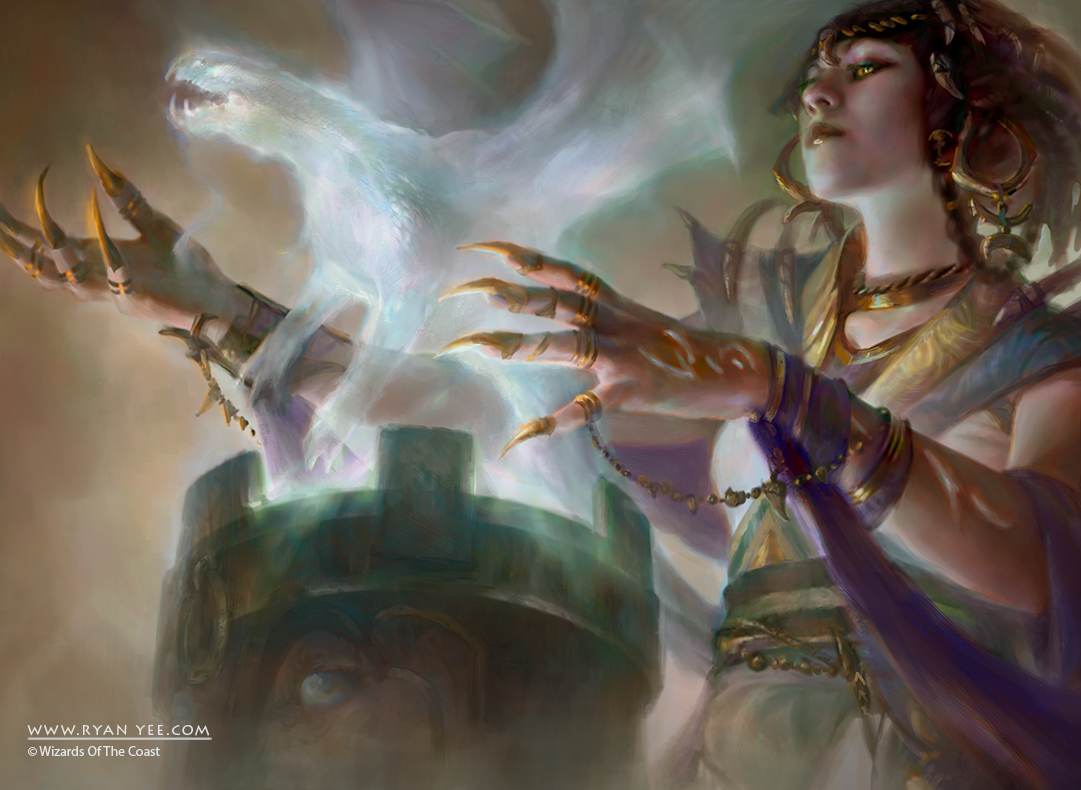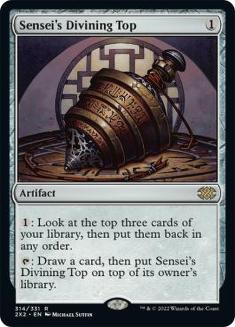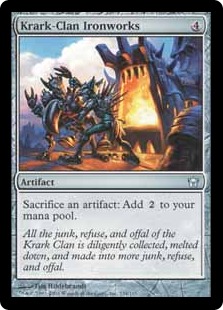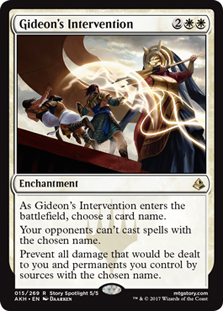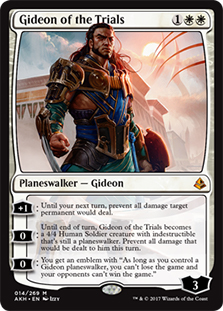Last week’s announcement of a coming ban announcement, to the surprise of no one, set off a storm of speculation covering all the major competitive formats. It seemed like every format was under threat from some card or another, but none of them were dominant enough to be complete locks to meet the ban hammer come Monday. There was even a buyout on Splinter Twin, proving that the nostalgia for the long-lost Modern deck is surging to new heights.
Despite all the uncertainty around what the announcement would bring, when it finally went live on Monday, I have to say I was surprised with what I saw. I expected that Pioneer would be the most likely to see a ban, given the narrative around Dimir Inverter and its recent performance in paper tournaments. I also expected Modern to remain untouched since that format hasn’t seen much play since the ban of Oko, Thief of Crowns and Mox Opal, and waiting to analyze the wealth of data from SCG Regionals seemed prudent.
Having played more Pioneer than Modern recently, I’ll stay out of the Once Upon a Time debate for now and focus on the smaller format. And I have to say, with some time to sit back and think about it, I wholeheartedly agree with leaving the format alone for now.
The two decks that have generated ban discussion in Pioneer are Dimir Inverter and Lotus Breach. The latter has clearly been contained by an increase in cards like Damping Sphere, Leyline of the Void, and Gideon of the Trials and recently has been relegated to the fringe of the metagame. It’s a powerful deck, but one that needs to catch the metagame by surprise to be truly great, similar to Dredge after the Golgari Grave-Troll ban.
However, Dimir Inverter has maintained or even increased its stature since the Players Tour weekends. At the most recent Pioneer Open, it placed four copies into the Top 8 and three into the Top 4. It’s been the clear choice among the SCG Tour’s top players, and I expect it will continue to be moving forward. But the question isn’t whether Dimir Inverter has been good, great, or even the best deck in Pioneer. The question is whether it has been good enough to ban, and despite the many cries for Inverter of Truth or Dig Through Time to go, I’m glad they’re still around. Here’s why:
Dimir Inverter Hasn’t Been Dominant
Metagame dominance has always been, and will always be, the primary metric by which cards are banned. After all, the Banned List should be a last resort, and unless a card is disruptive enough to cause players to lose interest in a format, giving players the more options is preferable to fewer options. Historically, Magic players have been willing to play through months of near-dominance by some very powerful decks, such as Izzet Phoenix in Modern and Abzan in Khans of Tarkir-era Standard.
This means that the bar for dominance should be very high. The above decks were among the best performing and most prevalent decks for months and the metagames around them managed to adapt and stay interesting. When I think of this bar, I think of Eldrazi Winter or Caw-Blade, where it was rare to play a non-mirror match on Day 2 of a major tournament, and you expected at least four copies of the dominant deck in each Top 8. Few decks in Magic’s history meet this standard, and Dimir Inverter isn’t one of them. At least not yet.
Creatures (7)
Planeswalkers (6)
Lands (25)
Spells (22)

A strong piece of evidence comes from Ian Duke’s published announcement, where he noted that Dimir Inverter has a 49% win rate in non-mirror matches over the last two weeks of Magic Online (MTGO) Leagues, and that win rate has been trending downward since the Players Tours.
Extrapolating from any Magic data is tricky business because there are so many variables that go into any given data point, from the specific build of each deck, to the relative skill of the players, to how they approach the matchup. But on sample size alone, I’m more willing to trust the large set of MTGO Leagues compared to a handful of paper events.
That doesn’t mean I think Dimir Inverter is a sub-50% deck against the field, but it strongly suggests that the metagame is adapting well to the new bogeyman, and that adaptation has led to a relatively diverse format. We see Azorius Control, Sultai Delirium, and Mono-White Devotion having real success, and some aggro decks like Bant Spirits and Mono-Black Aggro are hanging around. Dimir Inverter first emerged when the metagame was more aggro heavy, and now that it’s shifted away from that to decks that are more disruptive, the deck has come back to earth.
When it comes to explaining the gap between Dimir Inverter’s performance in paper and online, I think it’s clear that the deck attracts the better players, skewing its performance upward. Look at that Top 8 from SCG Indianapolis again. The Dimir Inverter decks were piloted by Pete Ingram, Ben Wienburg, Julien Henry, and Collins Mullen. All four are great players and among the most accomplished in the room.
Dimir Inverter offers a powerful shell with lots of decisions and flexible disruption. Thus, you have the potential for easy wins when your opponent doesn’t interact with your combo, and don’t have to fear any specific hate card, since you have answers for or ways to play around any problem. On top of that, the Dimir Inverter mirror is notoriously complex, so tight play and good sideboard plans will give you a significant edge.
I expect, despite its popularity, that Dimir Inverter will outperform its online statistics, but that it won’t often match its performance in Indianapolis, as players branch out to other decks that have proven themselves as great choices in the current metagame. Izzet Phoenix took a similar path through its time in Modern, beginning with dominant performances like at the Modern Open at SCG Worcester that generated hype for a ban. But it tapered off over time as the metagame adapted to it, and by the time Faithless Looting was banned, it was more due to Hogaak, Arisen Necropolis than Arclight Phoenix.
Simply put, a couple of impressive tournaments aren’t enough for Dimir Inverter to meet the bar of Eldrazi Winter or Caw-Blade.
Dimir Inverter Has Interesting Gameplay
The second metric by which cards are banned, and an underrated one in my opinion, is that they promote unfun or uninteresting gameplay. Cards like Sensei’s Divining Top and Krark-Clan Ironworks scored highly on this metric, though high power level was also a factor in each card’s demise.
As it’s ostensibly a combo deck, I’ve seen some arguments that Dimir Inverter promotes linear/non-interactive gameplay or that it’s necessarily boring and I have to disagree. Dimir Inverter is a control deck with a combo finish. It plays plenty of disruption from discard to removal to counters and generally begins a game with the mindset of taking the opponent out of what they’re doing.
The combo itself cannot win the game before Turn 5, a reasonable pace for Pioneer in my opinion, and it’s rare for these quick wins to happen against a prepared metagame with cards like Rest in Peace, Ipnu Rivulet, and Mystical Dispute so commonly played. None of the adaptations the metagame has adopted to combat Dimir Inverter strike me as particularly onerous; even the recent rise of Gideon’s Intervention has a card that can shut down the combo entirely and is quite difficult for a Dimir deck to remove.
Of course, because Dimir Inverter is so flexible and disruptive, attacking it successfully means more than playing a few hate cards and hoping they carry the day. You need a deck that’s robust enough to play through their disruption suite, which is why the deck preyed on the aggro decks that were prevalent at the Players Tours. With their early aggression easily stymied by a wealth of cheap disruption, Dimir Inverter players bought themselves time to assemble their combo with minimal interference. Now cards like Gideon of the Trials are applying significant pressure, stopping the combo, and dodging Fatal Push all at the same time, making things much harder.
Of course, by adapting to the current metagame, Dimir Inverter players will necessarily make themselves worse against the fast aggro decks, leading to a dynamic where pinning down the metagame and tuning the best list is incredibly important. Well, that’s exactly what we want to see in a metagame. There’s a tier of decks at the top that will always be good, but can be preyed upon if you find their blind spot on a given weekend. That’s your top tier. Beyond that you have your Tier 2 decks, which can succeed, but generally are only good choices when the metagame is ripe for them.
From my standpoint, Dimir Inverter is promoting healthy metagame dynamics and is full of interesting in-game decisions. There’s always the need to determine how aggressive you want to be with the combo, but outside of that you’re still a control deck that needs to utilize its resources efficiently while understanding exactly what the important threats are from the opponent and which ones you can let slide for a few turns.
Hard control decks are rare in Magic these days, because the diversity of threats is so great that it’s hard to keep your opponent in check for long enough to actually close the game. Having a combo finish solves that problem beautifully, and also forces the opponent to react to those cards rather than your disruption, thus making it easier to play fair. This is why combo-control decks are so dangerous, but they are incredibly interesting and dynamic to play with and against. So unless they prove to be too powerful, I’d opt to keep them around whenever they pop up.
Ban Fatigue
As far as I’m concerned my case is made by the first two points, but given the events of the last year I think it’s important to discuss ban fatigue. Honestly, I’ve never seen a decline in consumer confidence this large before. I wasn’t around for the Chronicles fiasco that led to the now-maligned Reserved List, but I have to think this is the worst consumers have felt about investing in cards since then. For much of my time in Magic, bans were quite rare. Modern needed some major adjustments after it was created, but outside of that bans were the result of truly oppressive archetypes, and those didn’t happen that often.
But after the dominance of energy in Kaladesh-era Standard, and then more recently Hogaak, Arisen Necropolis; Field of the Dead; and Oko, Thief of Crowns, it seems like we’ve had a ban every few months with little sign of it stopping. It’s very difficult to invest in a deck, especially in more expensive formats, when you may have to scrap it before it’s complete.
I’m not saying these cards shouldn’t have been banned – they were overpowered and oppressive to a historical level. But with what’s happened in recent years we need to be hyper-vigilant that any future bans are on that level.
I’ve historically been on the side of favoring healthy metagames over consumer confidence, but that was when the latter was high. The calculus of this balance has changed and now I think it’s time to let people play with their cards as much as absolutely possible. This is especially true in Pioneer, where players already endured the beta test period where cards were banned almost every week.
So many players in those days asked me when a safe time to invest in the format would come, because they were excited to play but didn’t want their first few decks banned and then be unable to pivot to another. That attitude, which was due to unique circumstances, is now bleeding into other formats, which is a major problem.
We’d all like to see overpowered cards not printed as often, and I hope this time is an aberration, but we can do our part by not getting too ban-happy, and reserving that fervor for cards that truly do warp the metagame in an unhealthy direction. Right now, Pioneer still looks great, and it’s trending away from Dimir Inverter and towards more diversity. Especially in a new format, it’s going to take time to find the right tools to keep powerful decks in check. Magic is a better game when we are given that time so players have a chance to combat breakout decks and incorporate them into a healthy, dynamic metagame.

